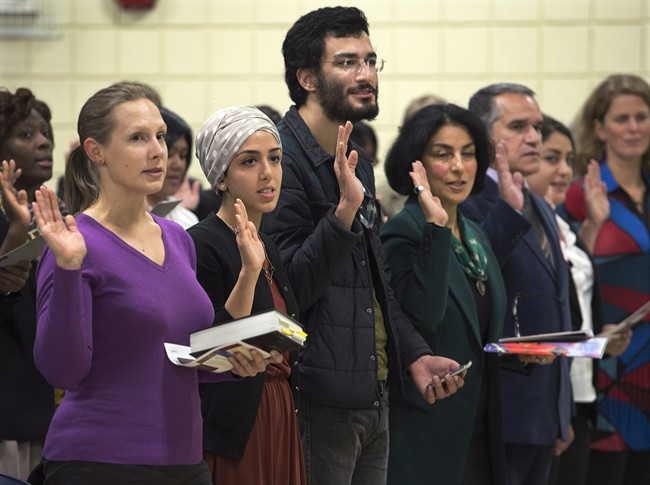Immigration Minister John McCallum may have gone into an appearance before a House of Commons committee on Tuesday expecting to be grilled on changes to the law that would restore Canadian citizenship to convicted terrorists, but what he faced instead were pointed questions about language requirements.

One of the lesser-known aspects of the government’s Bill C-6 is the narrowing of the age range for new citizens who are required to demonstrate proficiency in English or French. Currently, that range is 14 to 64, a widened span that was introduced under the Harper government.
READ MORE: Liberals move to repeal Tory law stripping terrorists of citizenship
The Liberals are now moving to revert back to the old age range of 18 to 54, meaning anyone older or younger than that will no longer need to prove adequate knowledge of one of the country’s official languages.
According to committee member and Conservative MP Michelle Rempel, that was a policy decision the Liberals made without any data to back it up.
Rempel asked McCallum on Tuesday morning if there had been any research or consultation to prove that narrowing the age range was a better option than simply providing more language training. McCallum acknowledged that there hadn’t been, but argued that the government is already investing many millions into language training programs.
“It sounds like a political decision rather than a quantifiable decision,” Rempel replied.
Her caucus colleague David Tilson agreed, saying he is particularly worried about new citizens aged 55 to 64 who may still be able to work, but will have no English or French.
“That gives me some concern,” Tilson said. “If they don’t fit into the labour market, then there is a problem.”
The narrowing of the age range will result in a dropping of the language requirement for about 16 per cent of new citizens, according to department officials who testified alongside the minister. McCallum said he is not particularly concerned for the younger cohort that will see the removal of the language test (ages 14 to 17).
“There are a myriad of reasons why an average 16-year-old would find it advantageous to learn English or French,” he said.
As for the older cohort, McCallum said history has proven they will adapt and contribute to society with or without English or French.
“The number of 55 to 65-year-olds exempt from language (proficiency) is not large,” McCallum argued. “Historically people in that age cohort have done well, even though in some cases their mastery of the English language or French language is limited.”
Rempel asked if the government would amend Bill C-6 or delay the change until more research is done. Her question was not directly answered.
Convicted terrorist to get citizenship back
McCallum was eventually asked by the committee members about the most controversial aspect of the bill: a provision that would restore the citizenship of convicted terrorists who had lost it under changes made by the Conservative government.
McCallum reiterated that the Liberals do not believe that there should be “different classes of Canadians,” and that it is a matter of principle. The mastermind of the Toronto 18 terror plot, Zakaria Amara, will see his citizenship restored under C-6 as soon as it passes in the House and receives royal assent.
Conservative MP Bob Saroya said that the fact that the government in Jordan, where Amara was born, doesn’t want him on their soil should tell McCallum everything he needs to know about the man.
“A terrorist is a terrorist is a terrorist,” Saroya said, borrowing from the phrase often used by the Liberals to defend their stance: A Canadian is a Canadian is a Canadian.
McCallum wouldn’t budge.
“We consulted a very broad public which is called the population of Canada in the last election. And they voted for us.”


Comments